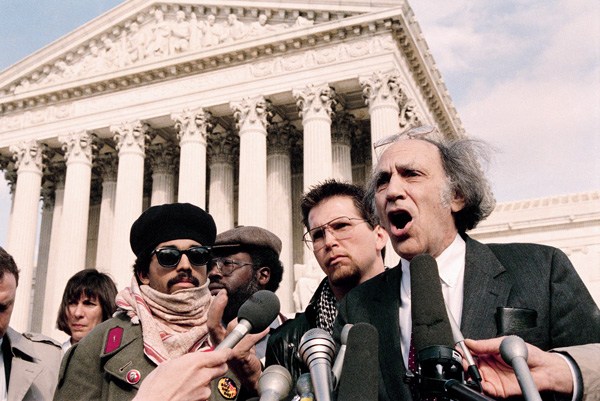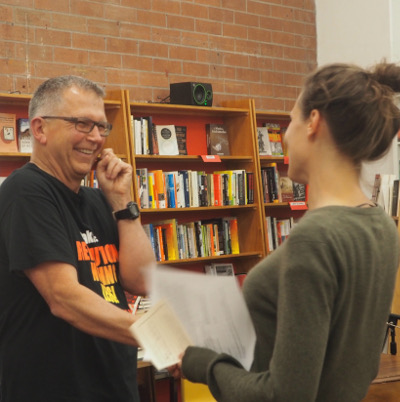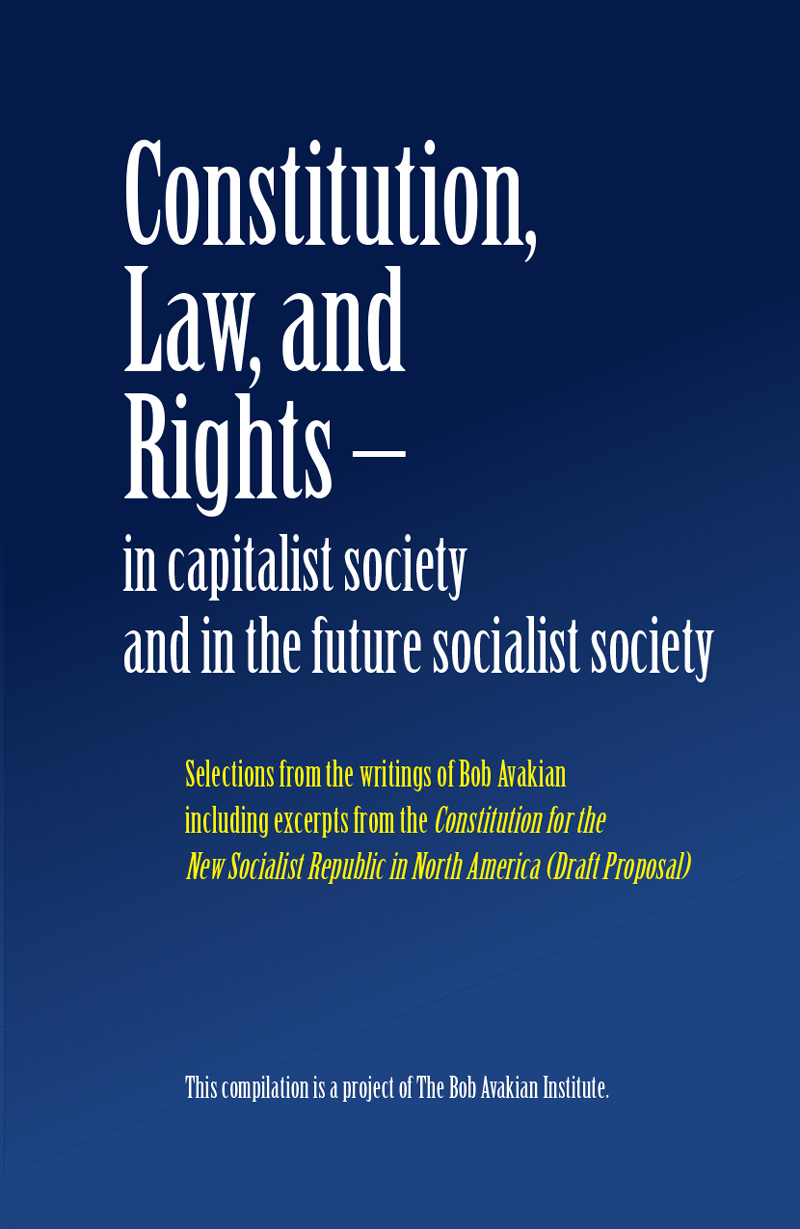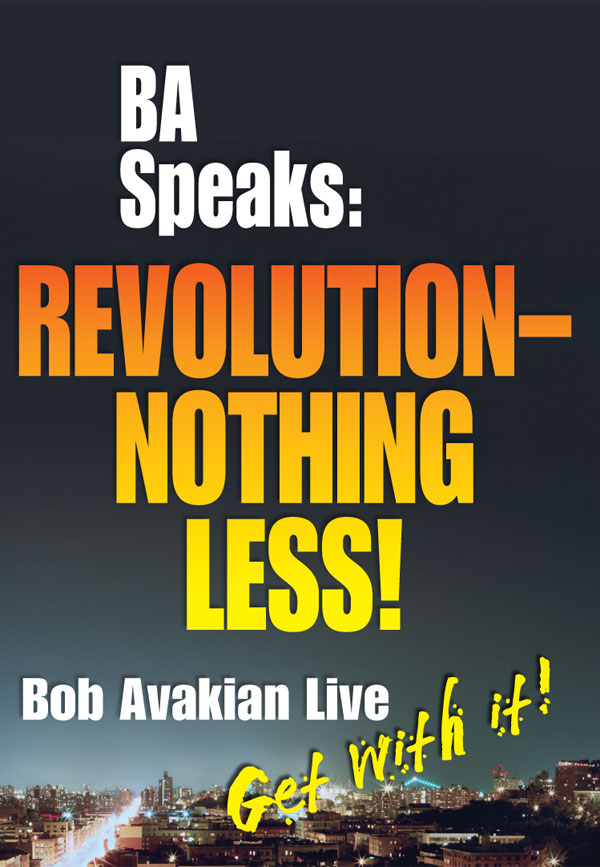Revolution Books Berkeley:
Showing William Kunstler: Disturbing the Universe, hosted by Notorious Flag-Burner Joey Johnson
September 5, 2016 | Revolution Newspaper | revcom.us
On September 3, Revolution Books in Berkeley held a showing of the film William Kunstler: Disturbing the Universe. It is the story of William Kunstler, the famous radical attorney from the 1960s. The showing was followed by comments and discussion led by Joey Johnson, notorious flag-burner, currently facing charges for burning the flag at the August Republican National Convention in Cleveland, with 16 other people (known as the RNC 16).

Attorney William Kunstler (right) and Joey Johnson (second from right) in front of U.S. Supreme Court during arguments presented in a historic legal and political battle to defend the right to burn the American flag. Photo: AP
The Revolution Books manager opened by talking about the store and why the store wanted to show this film—the story of an attorney like Kunstler who fought for the oppressed and the rights of the oppressed in the courtroom is very important, especially in times like the 1960s and now. This is an excellent film and well worth watching for anyone. In addition, a part of the film shows how Kunstler took the appeal of Joey Johnson’s conviction for burning the flag at the 1984 Republican National Convention to the U.S. Supreme Court (Texas v. Johnson). The Court made an extremely important decision upholding the right to burn the flag as protected political expression. This itself is important and is crucial to the legal defense of Joey Johnson and the RNC 16. And finally, just a few days before the film showing, San Francisco 49ers quarterback Colin Kaepernick took his courageous action of refusing to stand for the U.S. national anthem at the team’s pre-season football games.
So a lot was in the air in the days going into the event. And one thing that Revolution Books staff, supporters and the Revolution Club quickly learned, taking the event out on the Berkeley campus, is that very few students, even at the law school, had heard of William Kunstler. So it took work to bring students to an event like this. And not so many students came—the majority were from older generations—but the students who came were very glad they did.
After the film was shown, Joey Johnson made some comments and opened it up for questions. Here are some of the highlights of what people said and some of the discussion, including informal discussion that went on into the night after the formal event was over.
Two law students—one from Germany and one from India—said they were going to law school at UC Berkeley. The guy from India said that he had been looking into the law around freedom of speech in India, and he wanted to study what it meant in other countries, so he looked at the U.S. In the process of that, he had discovered, and read, Texas v. Johnson while in India. He said that he knew it was legal to burn the flag in the U.S., and he was impressed with that, but until he saw the film, he had no idea of the tremendous struggle that was involved in this.
The law student from Germany said that William Kunstler and his legal method of putting the system on trial in the course of a legal case was known about and studied in Germany. That is what drew her to see the film. She spoke to how moved she was seeing the film—the way Kunstler had left behind a conventional life of an attorney and had come to fight for the oppressed. Now, she said, we have to go back to the law school and study corporate law—she said she now felt bad about it. “This film is a life-changing experience.”
Someone spoke from the floor to how people, especially people in law school, should be inspired by people like Kunstler and what he did, but there are unfortunately very few around like him today who understand what he did about waging the legal and political battles, that what he did made a major contribution to revolution, and that these are also issues for the lawyers in the case with Joey and the Revolution Club in Cleveland.
Joey Johnson spoke to this as well, raising that he thought the film really brought out how Kunstler was transformed by the times—by the ’60s, how he came to see the law as serving an illegitimate white supremacist system, and how his views of the law were also changed by his clients, the defendants, he represented.
He also said that it is really important to understand that this legal victory in Texas v. Johnson was hard-fought—that one of William Kunstler’s strengths as a lawyer and why Joey Johnson wanted him as the lawyer in the Supreme Court case was that Kunstler understood you have to go outside the boundaries of the law and take it on as a political battle as well as a legal battle. Joey Johnson described Kunstler going with him to speak about the case—they went to law schools, a high school in the Bronx, Stanford University, and other schools. They went on MTV. They went on the Donahue show (an important TV talk show at the time) when President Bush (the first) threatened a constitutional amendment banning flag burning.

Joey Johnson, notorious flag-burner, currently facing charges for burning the flag at the August Republican National Convention in Cleveland, with 16 other people (known as the RNC 16).
Joey Johnson went into how there were a lot of dimensions to all of this. When the flag case was going on, there was a major international incident where the author Salman Rushdie was being threatened by authorities in Iran for blasphemy against Islam for a novel he wrote. Joey said people told him they could relate to his case because the Texas law he was arrested under for burning the flag was called “desecration of a venerated object.” There was an important dimension, as well, of artists involved in the case. Dread Scott did a famous art installation. There was an amicus brief where artists who had used flags or flag-related images in their work raised that if Johnson’s conviction for flag burning were upheld, art would be criminalized. All of this and more entered into a huge societal debate where millions could see that a Supreme Court upholding criminalizing flag burning would amount to forced patriotism. The final Supreme Court decision was close—5 to 4. And Joey Johnson stressed the underlying revolutionary internationalism behind burning the flag. In Cleveland, when he spoke before burning the flag at the RNC protest, he said America was first in genocide, slavery, and nuclear incineration, and “I wish I could have said more but the police were closing in.”
A woman stepped up and told a wrenching story. She was visiting from another country, and her family had come to that country as refugees from a country in the Middle East that the U.S. had invaded and ravaged. Her father and other family members had been brutally and viciously attacked by U.S. soldiers and as a young woman she had been bitterly angry, and so furious at the U.S. that she could not conceive of anything good in America and had refused to come to America. She had tried to sue the U.S. military in court for what had been done to her family—of course she got nowhere. Coming from her perspective on all this, she said she had never considered harming anyone herself, but she fully understood and felt the fury and rage that drives people to commit terrorist attacks. She had finally decided to come to see Berkeley—and had by chance come to see Revolution Books and then this movie. She spoke after the film of how exciting it had been to her to completely, unexpectedly come upon Revolution Books—to come to understand more fully that the U.S. people and the U.S. government were not the same. And to see that inside the U.S. were people who stood up to and repudiated the U.S. empire and its crimes, and who rejected U.S. patriotism and stood with the oppressed all over the world. This was deeply moving to her.
Near the end of the evening, Joey Johnson focused some on Colin Kaepernick’s righteous refusal to stand for the national anthem, and the need for everyone to have his back. He said that the authorities are exerting all kinds of pressure on him, to bully him, and it is important for everyone in society that feels this way to support him. He called on people to work with him after the event to get organized to go out to the high school football games in response to the call from revcom.us to “Sit Down for Their Nasty-full Anthem.”
There was much more, but this should be enough to give a picture of a powerful, moving event.
Volunteers Needed... for revcom.us and Revolution
If you like this article, subscribe, donate to and sustain Revolution newspaper.








